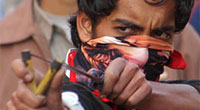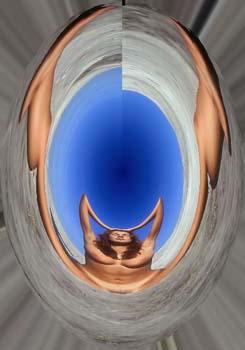By Sanjoy Majumder BBC News, Kathmandu 
Hundreds of people joined a protest in Kirtipur, Kathmandu
"I hope you've brought peace to our troubled land."
The immigration officer at Kathmandu 's Tribhuvan international airport looked up as he stamped my passport, resplendent in his blue uniform.
"We need democracy, total democracy not partial," he said.
"Make sure you put that in your report. Without democracy we cannot develop as a nation. Enough is enough."
For the past few days, the tide appears to have turned against King Gyanendra.
What started out as a political protest by a seven-party alliance, and then translated into a show of people power as Nepalis stormed the streets across the country, has finally crossed another frontier.
Professionals, lawyers and now bureaucrats - including from the all-powerful home ministry - have joined the struggle, some in spirit and others more substantially.
Public sentiment
The one institution above all others that has remained loyal to the king has been the Royal Nepalese Army.
But as flak-jacketed soldiers patrol the corner of every street in the Nepalese capital, they are acutely aware of the public mood.
"The public sentiment here is far too strong," says one local journalist.
"The protests have spread far wider and appear to be much more intense than those of 1990," he added, careful to remain unnamed, with the administration particularly severe against the media.
The king... is so removed from reality that he has to step aside
Lakshmi, protester
That was the year when the former monarch, King Birendra, was forced to usher in multi-party democracy in the wake of public protests.
The mood against his brother, who ascended the throne after King Birendra's brutal murder in the 2001 palace massacre, is equally strong.
On the eve of a planned mass protest in the capital, political rallies took place in pockets around Kathmandu.
In the suburb of Kirtipur, more than 1,000 people gathered at the main market square as speaker after speaker railed against the king.
"This is a criminal regime," shouted one speaker, representing local traders.
"The king must go - he must go now."
"He must go - he must go now," chanted the crowd, cheering and clapping.
Single issue
Narayan Rathod Singh is a local member of the mainstream Nepali Congress Party.
He says things have moved beyond party politics.
"It is no longer important which party you belong to or what you believe in," he says.
The king is not somebody with our interests at heart
Pawan, protester
"There is only one issue before us - restore democracy.
"There is not a single person here who does not support that," he said waving his hand at the crowd.
"I grew up believing in the king and what the monarchy represents," says Lakshmi, who was attending the rally with her children.
"But the king has let us down. He is so removed from reality that he has to step aside.
"I don't think they should grow up in a Nepal which is an absolute monarchy," she says looking down at her little son and daughter.
Ravi Thapa and his friend, Pawan, are students.
He admits that joining the protests at first was fun - daring even - but that he had thought little about the issues at stake.
Now, however, he is clear in his mind.
"When the shootings started and the beatings I knew that this was serious.
"I also realised that the king is not somebody with our interests at heart. If he did, he wouldn't have filled the jails with ordinary people.
"He wouldn't have ordered his army to open fire on innocent civilians.
"He is not an aristocrat - he's an autocrat."
A few hundred metres away from the Kirtipur rally, smoke rises from a still smouldering burnt tyre.
Children run past it shouting, unmindful of what it represents.
But for King Gyanendra, safely ensconced behind the high walls of Kathmandu's Narayanhiti Palace, it is a sign that the public mood could quite easily turn ugly.
Time's run out
The Kathmandu Post
The rulers and elite have always ditched the Nepali people. The dark history dates back to 1768, when a smart warrior king unified the country with the help of the poor people, but his successors never recognized their rights and sovereignty. The oppressed denizens, who woke up to fight for their rights in 1950, successfully toppled the Rana oligarchy. Unfortunately, the 1950 agreement brought the monarchy to the fore. Consequently, the successive monarchs played the "cat-and-mouse" game with people's representatives to deny their rights. In December 1960, King Mahendra ousted the elected government and established the autocratic Panchayati that lasted for 30 years. In 1990, the late King Birendra showed certain farsightedness and bowed down before the people. However, the elite and monarchists immediately started hatching conspiracy against the restored democracy. In order to show one-upmanship to his slain brother, King Gyanendra usurped all state authority by staging a coup on Feb 1, 2005. But in just over a year, the king's move has culminated in a deep political crisis.
The Nepali people of 21st century have become so infuriated with the king that many wonder whether he will manage to save his crown. If the monarch dilays further to address the problem, the country will not remain a kingdom. For the king the time has run out. More than 12 people have already lost their lives since the people's movement waged by the seven party alliance began on April 6. On the fifteenth day alone, the security forces shot dead three protestors in the capital and critically injured dozens of demonstrators. No ruler can get away by killing innocent people. King Gyanendra will certainly be held accountable for the deaths and injuries of so many people. If the chairman-cum-king continues to play with the fire and refuses to bow down before the people, he is waiting for a political disaster.
Reportedly, the king is trying to seek a solution by appointing a middleman like former Prime Minister Krishna Prasad Bhattarai as the prime minister. But the movement has reached a new level of intensity where neither an individual nor any political party can rescue the monarch out of the current political imbroglio. We believe the king has gone to the extent of no return. Even if he restores people's sovereignty as per people's wishes, he may not be able to protect the 237-year old institution. The country is in flame. It has witnessed a dozen of deaths. Who is responsible for these deaths? The people know it well. If such peaceful demonstrations continue to see more deaths, the people would not accept any peaceful settlement. Let us hope Indian and other foreign envoys have transpired the message to the king.
